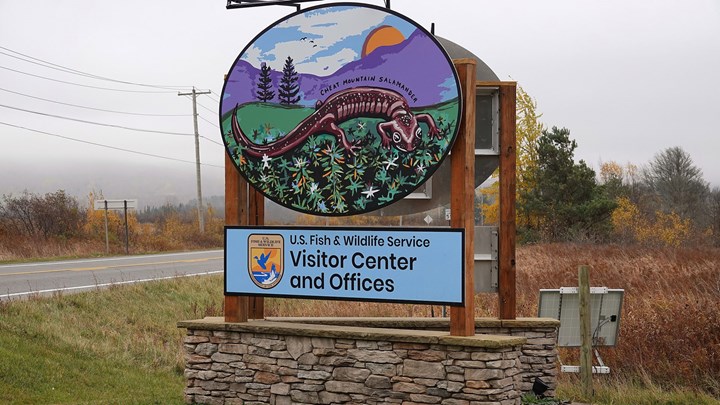
by Mark Chesnut - Tuesday, December 31, 2024

In the ongoing controversy over the use of lead ammunition for hunting in national wildlife refuges, far-left environmental groups just notched a minor win in West Virginia.
We told readers back in 2023 about how the Biden administration was attempting a tradeoff that would open several national wildlife refuges for hunting but also ban the use of traditional lead ammunition on eight national wildlife refuges (NWRs), including Canaan Valley NWR in West Virginia. After pushback by sportsmen’s groups and the state of West Virginia, the U.S. Fish & Wildlife Service (USFWS) decided to withdraw plans to ban hunting with lead ammunition on that refuge in exchange for not expanding hunting opportunities there.
Now, under heavy pressure from the Sierra Club, the National Wildlife Refuge Association and other extremist environmentalist groups, the USFWS has signed an agreement to revisit the earlier decision to not ban lead ammo at Canaan Valley NWR and make a “reasoned decision” on the subject by 2026. In the meantime, the USFWS will require non-lead ammunition on the newly accessible Big Cove section of Canaan Valley, which makes up about 15% of the refuge’s land area.
“Defendants agree that, in the proposed rule for the Service’s 2026-2027 annual station-specific hunting and fishing regulations, the Service will expressly request public comment on whether or not to promulgate a lead-free requirement for hunting on the entire Canaan Valley NWR with immediate or delayed effect,” the agreement states.
“Defendants agree that the Service will make an express, written decision, in the Final Rule for the Service’s 2026-27 annual station-specific hunting and fishing regulations (“Final Rule”), on whether to include or omit a lead-free requirement for hunting on the entire Canaan Valley NWR. If included in the Final Rule, such a lead-free requirement for hunting on the entire Canaan Valley NWR will be promulgated upon publication of the Final Rule, with immediate or delayed effect.”
The agreement further states: “The Service retains the discretion to decide whether to include or omit a lead-free requirement on the entire Canaan Valley NWR and this Agreement does not commit the Service to any particular outcome.”
For their part of the agreement, filed with the U.S. District Court for the District of Columbia, the environmental groups will drop their lawsuit against the USFWS along with the National Rifle Association, Safari Club International and the Sportsmen’s Alliance Foundation.
The NRA has been involved in the fight against bans on lead ammo for hunting for decades and has won its share of victories on the issue. As we’ve mentioned many times in the past, those pushing lead ammunition bans are doing so without proof that lead ammunition is harming wildlife populations on public lands, including national wildlife refuges. Additionally, non-lead ammunition, often made of copper alloys, is routinely cited as being at least 25 percent more expensive than traditional lead varieties. It also can be very difficult to find at retail operations as there simply is not that much of it made compared to traditional lead ammunition.
Along with sportsmen’s groups, some federal lawmakers concerned over the lead bans on national wildlife refuges have proposed legislation to remedy the problem. Earlier this year, the U.S. House of Representatives approved a measure by U.S. Rep. Rob Wittman (R-Va.), that would protect the use of lead ammunition on some federal lands. H.R. 616, the Protecting Access for Hunters and Anglers Act, specifically bars the Department of the Interior and the Department of Agriculture from prohibiting or regulating the use of lead ammunition or fishing tackle on federal land or water that is under the jurisdiction of such departments and made available for hunting or fishing.
After the measure passed the U.S. House with a vote of 214-201, it was assigned to the U.S. Senate Committee on the Environment and Public Works. That committee hasn’t yet considered the bill, but with Republicans winning control of the Senate in November, one would think the measure’s chances of being passed by that body are much higher.
In 2023, a different bill before the U.S. Senate would have prohibited the USFWS, Bureau of Land Management (BLM) and U.S. Forest Service (USFS) from banning the use of traditional lead ammunition and fishing tackle absent approval by the applicable state fish and wildlife agencies and proof that lead ammunition and tackle is primarily causing a decline in wildlife species’ populations. That measure, however, never advanced out of a Senate committee.
About the Author
Freelance writer and editor Mark Chesnut is the owner/editorial director at Red Setter Communications LLC in Jenks, Okla. An avid hunter, shooter and field-trialer, he has been covering Second Amendment issues and politics on a near-daily basis for over 25 years.
E-mail your comments/questions about this site to:
[email protected]
Proudly supported by The NRA Foundation and Friends of NRA fundraising.
